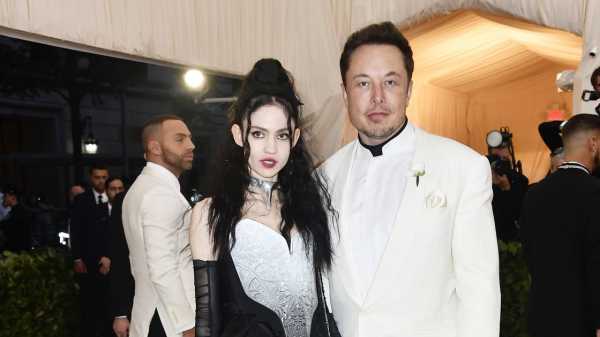
At Monday night’s Met Gala, held to celebrate the opening of the Costume Institute’s new show, “Heavenly Bodies: Fashion and the Catholic Imagination,” Kim Kardashian appeared as a sexy liquid-gold-dipped statuette, in a skintight Versace dress; Rihanna stepped out as a sexy Pope in sparkling Margiela by John Galliano, complete with ceremonial mitre; and Jared Leto, also plenty sexy, made the rounds as a Jesus manqué, in embroidered Gucci togs and a gilt crown of thorns. But for some the focal point of the evening lay elsewhere. Mere hours before the gala began, the New York Post’s Page Six reported that the Silicon Valley billionaire Elon Musk—the forty-six-year-old C.E.O. of the electric-vehicle company Tesla and the aerospace company SpaceX, who has discussed his plans to colonize Mars—had been “quietly dating” Claire Boucher, also known as Grimes, the thirty-year-old, critically lauded electronic musician, who once sailed a D.I.Y. houseboat loaded with live chickens and bushels of potatoes down the Mississippi River and who, in a Profile in this magazine in 2015, was deemed possibly too punk to become a pop star. It was almost immediately after the news of this unlikely coupling broke that the pair appeared at the Met Gala, setting a possible world record for the shortest amount of time elapsed between the announcement of an under-the-radar relationship and that relationship’s extremely public outing.
On the red carpet, as Musk and Boucher posed for photographs, Musk wore a white dinner jacket and white shirt with an inverted priest’s collar—the clerical tab black—and spoke to the press, as Boucher stood beside him, dressed in distinctly goth garb: black lace-up platform boots, black-dyed tresses, blood-red-stained lips, sheer fingerless gloves, a strapless corset, and a black, poufy, business-in-the-front, party-in-the-back skirt. Around her neck, she wore a choker that looked, some noted, like the Tesla logo (a suggestion that Musk quickly denied). Seen together, the couple appeared radically mismatched: not unlike, as one friend noted, a cater waiter picking up his girlfriend from a Siouxsie Sioux-themed costume party.
The pairing was satisfyingly surreal, in the way of the familiar Bréton formula, with an umbrella and a sewing machine placed on an operating table, forcing meaning out of meaninglessness. Pleasingly, too, one after the other, Twitter users shared their own versions of Musk and Boucher, culling past pop-cultural references that have matched straight man and disaffected goth, each seemingly more spot-on than the next: a nerdily bespectacled Jason Schwartzman with a turquoise-haired Mary Elizabeth Winstead in “Scott Pilgrim Vs. the World”; the “Despicable Me” villain Gru reading a book to the enormous-eyed, micro-banged, pixie-ish tot Agnes; the “Breakfast Club” jock, played by Emilio Estevez, with his outcast love interest, played by Ally Sheedy.
Largely thanks to social media, we have lately been experiencing the world as an enormous, fast-moving combinator, from which events are plucked willy-nilly and sometimes simultaneously: a push notification about Prince Harry and Meghan Markle’s nuptials chased by another about the gutting of the Iran nuclear deal; Kanye West tweeting about his love of naps tugging at our attention alongside his claim to TMZ that slavery was a “choice”; the helpless laughter that often erupts while reading Trump’s morning tweets almost always checked by concurrent horror. In this context, the weirdness of a union-busting billionaire with neo-colonial leanings suddenly dating a quirky Canadian musician who, until recently, had “anti-imperialist” in her Twitter bio makes a certain kind of sense. According to Page Six, the couple met when Musk recently tweeted the words “Rococo Basilisk,” a near-nonsensical pun riffing on the A.I. thought experiment Roko’s Basilisk, which hypothesizes about the likelihood of a future artificial superintelligence killing those who didn’t help to bring it into being; he discovered that Boucher made the same joke three years ago, and reached out to her. The possible connection here could be neatly characterized as Burning Man-esque. One can imagine the pair sharing insights about space travel, psychedelics, polyamory—mining the kind of self-exploration that has begun to split the difference between Silicon Valley libertarian nerd-core and millennial Tumblr-bred experimentalism.
It’s often said that the line between mass and indie culture has completely collapsed in the past couple of decades, gone the way of flannel shirts, baby-doll dresses, and “corporate rock still sucks” T-shirts. Now we can drop acid to discover our inner child while becoming tech billionaires, or, more modestly, listen to obscure music while watching the Kardashians. Boucher’s music isn’t especially obscure, nor is her aesthetic; compared to Musk, though, she is the reincarnation of Klaus Nomi. Of course, Grimes is no innocent held against her will, and the artist can choose whom she wants to date. But, despite all the joking, there was ultimately a sense of deep disappointment in many people’s responses to the new couple, which revealed a nostalgia for a time when political differences translated more securely into differences of taste, and vice versa. What if ideological distinctions still mattered and were not so easily swept away by a levelling torrent of information and capital? What if anything still meant something?
Sourse: newyorker.com






